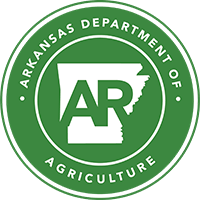Plant Industries
Serving the citizens of Arkansas and the agricultural and business communities by providing information and unbiased enforcement of laws and regulations set by the Arkansas State Plant Board
Lab Analysis
General Information on Lab Analysis
The Arkansas Department of Agriculture Seed Laboratory is the Official Seed Laboratory for Arkansas. Seed Analyses are conducted according to the rules established by the Association of Official Seed Analysts (AOSA) (unless methods or rules are unavailable for a crop). The Seed Division currently has several employees who have completed training and testing required to be AOSA Certified Seed Analysts in either purity, germination or both. There are three types of samples received by the Seed Lab: Certified, Non-Certified, and Regulatory.
Certified Seed Samples:
Certified Seed is seed that has been produced in accordance with the high standards and regulations outlined in Circular 15: Official Standards for Seed Certification in Arkansas. Participation in this program is voluntary, except for those marketing seed protected under the Plant Variety Protection certified seed option. The Seed Lab checks these samples for Kind, Variety, Weed seed, Other Crop, Inert and Noxious Weeds. Besides the physical purity, where the seed is checked for characteristics of the variety such as size, shape, and/or hilum color, several other tests are conducted to help confirm variety. These tests include: grow-outs such as the hypocotyl test on soybeans and coleoptile test for wheat, chemical tests such as soybean peroxidase reactions, herbicide resistance tests, and fluorescence tests for oats. The certified class applied for and kind of seed determines the amount of seed analyzed for purity (See Chart Below). The germination tests are conducted on 400 randomly selected seed from each sample on both certified and non-certified seed.
Certified Seed is known for its high quality, therefore a complete analysis (purity and germ) is only conducted on cleaned seed. Uncleaned seed may be sampled by an inspector for germ, varietal purity, noxious weeds and moisture as an aid in making conditioning decisions, but purity percentages and certified classes will not be assigned.
Non-Certified Seed Samples:
These are Service samples that are submitted by the seedsman/farmer that have not been applied on, or do not meet the requirements, for Certified Seed. The Seed Lab checks these samples for Kind, Weed Seed, Other Crop, Inert, and Noxious Weeds. A 100 gram portion of samples of soybeans, rice, and small grains that the sender designates as a particular variety will also be checked for seed characteristics, and this will be reported as percent other crop. This information is recorded under Seed Characteristics on the middle part of the analysis form. If more complete information is needed for use in labeling the percent other crop on a non-certified seed lot with variety stated, the farmer/seedsman may request a Seed Characteristics Exam. This exam is conducted on a pound of the seed and provides a better indication if other varieties or off-types are present. Also on request, herbicide resistance tests are conducted if methods are available.
Non-Certified seed samples may be drawn from either cleaned or uncleaned seed by the farmer/seedsman. Remember, however, the lab analysis is only as good as the sample! So try to get a sample that is representative of the lot. (If the Plant Board is to print analysis labels, the sample must be drawn by a Plant Board Inspector from cleaned, bagged seed and variety information must be supplied.)
Comparison Of Tests Conducted And Amount Of Seed Analyzed:
| Non-Certified | Certified | ||||
| Kind | Non-Certified | Kind | Foundation | Registered | Blue-Tag |
| Soybeans | 1 # C,W,N 100 gram SEED CH. | Soybeans | 3 # V,C,W,N, HYP | 1 # V,C,W, HYP 3 # N | 1 # V,C,W 2 # N |
| Rice | 50 g C,W, SEED CH. 1 # N | Rice | 1 # V,C,W 4 # N | 1 # V,C,W 4 # N | 1 # V,C,W 4 # N |
| Wheat | 100 g C,W, SEED CH. 1 # N | Wheat | 1 # V,C,W,N COL, PHN | 1 # V,C,W,N COL, PHN | 1 # V,C,W,N |
Legend: C=Crop, N=Noxious Weeds, V=Variety, W=Weed Seed, Seed CH=Seed Characteristics Exam,
HYP=400 Seed Hypocotyl Test, COL=100 Seed Coleoptile Test, PHN=100 Seed Phenol Test
Regulatory Seed Samples:
Samples that are drawn by the Plant Board from seed that has already been labeled and is in the trade channels are called regulatory samples. The Seed Lab checks these samples to determine if they are in tolerance with the analysis on the label. The location where the seed was sampled receives a regulatory analysis report stating they are in tolerance and also shows what contaminants were found (major crops only-soybeans, rice, wheat, oats). If the analysis is not in tolerance with the label, a stop-sale will be issued to prevent the seed from being sold until it has been brought into compliance with the lab’s findings, or released for return to the manufacturer. The seedsman on the label is responsible for relabeling the seed or for its proper disposal. Stop sale notices are also issued by Plant Board Inspectors for technical violations such as failure to secure an Arkansas Seed Dealer’s license, or insufficient information on the label. All stop-sale notices must have a written release issued by the inspector after appropriate measures are taken to correct the violation.
Records are kept for each company/individual whose name appears on the label of regulatory samples submitted to the lab. The Seed Committee of the Plant Board reviews these records each year. The Federal Seed Act regulates seed in interstate commerce, requiring proper labeling and prohibiting misrepresentation of seed transported from one state to another. By agreement between Federal and State authorities, randomly selected regulatory seed samples of interstate shipments are sent to the USDA Federal Seed Laboratory to be grown in varietal test plots. If samples are found to be mislabeled as to variety, investigations are made to determine who is responsible for the mislabeling and appropriate actions are taken.
We encourage all farmers, especially those planning to plant their own saved seed, to have it cleaned and tested to determine the quality of the seed for planting, and to help prevent the spread of weed seed, nematodes and other diseases. For more information on Seed Quality, request Extension Fact Sheet(s)2019 and 2141 from your local Cooperative Extension Service office.
For further explanations of any of the information on Plant Board Laboratory Analyses or to request a copy of the Regulations on the sale of Planting Seed (Cir. 10) and Official Standards for Seed Certification (Cir. 15), please select the links below, or contact the Arkansas State Plant Board Seed Division at (501) 225-1598.

